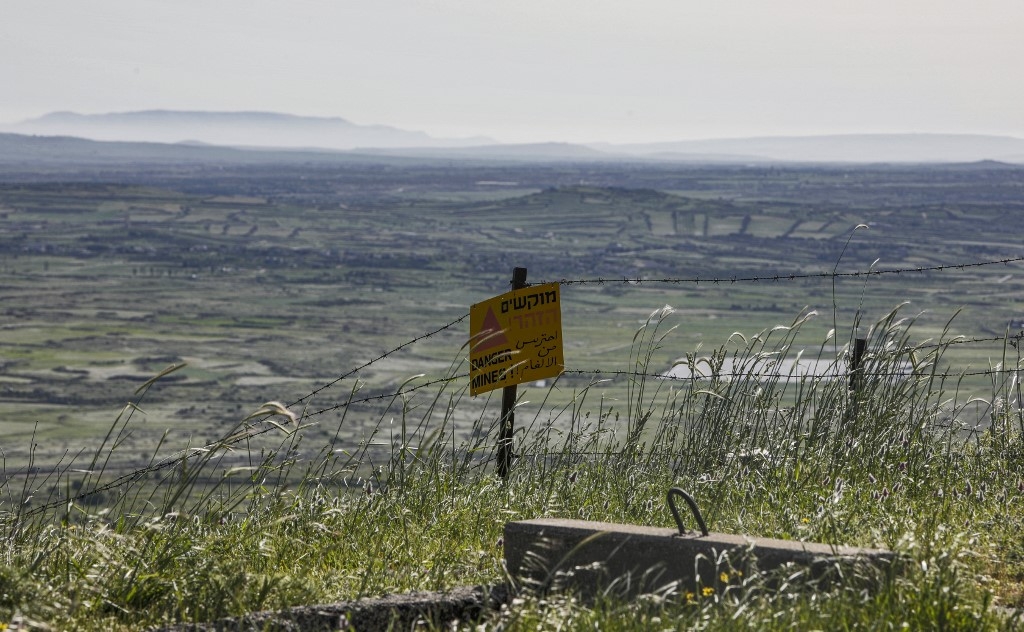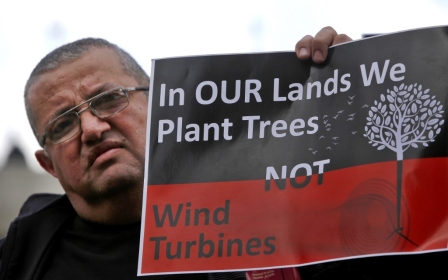US denies Biden is reversing recognition of Israel's claim to Golan Heights

The US State Department has denied a media report that claimed the Biden administration planned to rescind recognition of Israel's claim over the occupied Golan Heights.
A State Department official told Middle East Eye on Friday: "Our policy on Golan has not changed."
The State Department's Near Eastern Affairs Department tweeted earlier: "US policy regarding the Golan has not changed, and reports to the contrary are false."
The denials came after the Washington Free Beacon published a story on Thursday, headlined: "Biden Admin Walks Back US Recognition of Golan Heights as Israeli Territory."
New MEE newsletter: Jerusalem Dispatch
Sign up to get the latest insights and analysis on Israel-Palestine, alongside Turkey Unpacked and other MEE newsletters
In March 2019, former US President Donald Trump signed an executive order recognising Israel's sovereignty over the occupied Syrian Golan Heights, a move that experts at the time denounced as a violation of international law that prohibits states from acquiring land by force.
Since entering office, the Biden administration has largely avoided speaking about the status of the territory, with Secretary of State Antony Blinken saying in February that US policy regarding the area would depend on the regional situation and the future of Syrian President Bashar al-Assad's rule.
"Leaving aside the legalities… as a practical matter, the Golan is very important to Israel's security. As long as Assad is in power in Syria, as long as Iran is present in Syria, militia groups backed by Iran, the Assad regime itself - all of these pose a significant security threat to Israel," Blinken said at the time.
"Legal questions are something else. And over time, if the situation were to change in Syria, that's something we'd look at," the secretary continued.
The Golan Heights: Why it matters
+ Show - HideOfficially part of Syria since the country’s independence in 1944, the Golan Heights is a strategic plateau straddling Israel and Syria and overlooking southern Lebanon.
It was captured by Israel during the Middle East war of 1967 and subsequently annexed in a move never recognised by the international community.
The Golan is recognised as part of Syria by the United Nations. UN Resolution 242 calls for Israel to withdraw from the Golan and other occupied territories including the Gaza Strip and the West Bank.
However, Israel has repeatedly refused to do so and in 1981, it formally annexed the Syrian territory.
A UN peacekeeping force has patrolled the demarcation line between Syrian and Israeli-controlled areas of the Golan since 1974.
Israel has constructed settlements that are illegal under international law in the occupied territory and settled its citizens there.
Some 20,000 Israeli settlers currently live in the Golan, alongside around 26,000 of the territory’s native inhabitants, who are predominantly Druze and identify as Syrian.
Since the Syrian war erupted in 2011, Syrians in the Golan taking Israeli citizenship has become more common, though the vast majority reject it.
The Golan is thought to provide around one-third of Israel's fresh water supply. Water from the territory flows into the Sea of Galilee and Jordan River.
Other than its strategic significance - the Golan is the only land border between Israel and Syria - the territory is also used by Israelis for leisure purposes. The area counts an Israeli ski resort and several vineyards.
In an attempt to quell unrest within Israel over the Washington Free Beacon's story, Israeli Foreign Minister Yair Lapid dismissed the report as seeking to "hurt the new government".
"Those who spread rumors about the US rescinding its recognition [of the Golan Heights] harm our security, our sovereignty and are prepared to cause real damage to the State of Israel and its relations with the US, just to hurt the new government," Lapid said.
The Golan Heights was officially recognised as a part of Syria when the country acquired independence in 1944 - years before Israel was created.
A strategic plateau straddling Israel and Syria and overlooking southern Lebanon, the resource-rich region was captured by Israel during the war of 1967 and subsequently annexed.
Despite numerous wars, claims and counter-claims, the move was never recognised by the international community.
Still, several Republican lawmakers are seeking to pass legislation recognising Israeli sovereignty over the territory.
"The Golan Heights provide Israel with defensible borders and serve as a key buffer between Israel and the chaos in Syria," US Congressman Mike Gallagher said last month.
"At a time when Israel - our most important ally in the Middle East - is literally under attack, we should do everything in our power to ensure they can defend themselves. Ensuring we continue to recognize their sovereignty over the Golan Heights is the most basic way we can do so."
Middle East Eye delivers independent and unrivalled coverage and analysis of the Middle East, North Africa and beyond. To learn more about republishing this content and the associated fees, please fill out this form. More about MEE can be found here.




